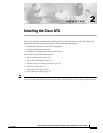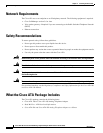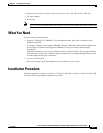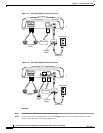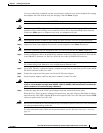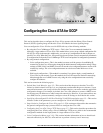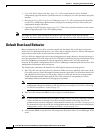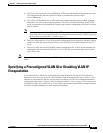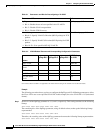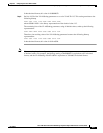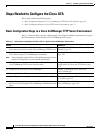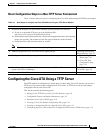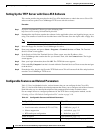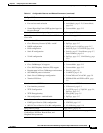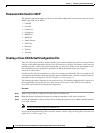
3-3
Cisco ATA 186 and Cisco ATA 188 Analog Telephone Adaptor Administrator’s Guide (SCCP)
OL-3141-01
Chapter 3 Configuring the Cisco ATA for SCCP
Specifying a Preconfigured VLAN ID or Disabling VLAN IP Encapsulation
4. The Cisco ATA contacts the Cisco CallManager TFTP server and downloads the appropriate .xml or
.cnf configuration file that allows the Cisco ATA to communicate with the correct
Cisco CallManager.
5. The .xml or .cnf file that the Cisco ATA downloads includes information about which signaling
image the Cisco ATA needs to function properly. The Cisco ATA finds that image on the TFTP
server and automatically downloads this image along with the corresponding version of Cisco ATA
release software.
Note If you are not using a Cisco CallManager TFTP server, you need to manually upgrade the
Cisco ATA to the correct signaling image. For information on this procedure, see the “Upgrading
the Signaling Image Manually” section on page 7-4.
6. The Cisco ATA looks for a Cisco ATA-specific configuration file (designated by the MAC address
of the Cisco ATA and named ata<macaddress>) on the TFTP server and downloads this file if it
exists.
7. If the Cisco ATA does not find the MAC-address configuration file, it looks for the atadefault.cfg
configuration file and downloads this file if it exists. This file can contain default values for the
Cisco ATA to use.
Note When the Cisco ATA is downloading its DHCP configuration, the function button on the top panel
blinks.
Specifying a Preconfigured VLAN ID or Disabling VLAN IP
Encapsulation
If you want the Cisco ATA to use a preconfigured VLAN ID instead of using the Cisco Discovery
Protocol to locate a VLAN, or if you want to disable VLAN IP encapsulation, refer to Table 3-1 for a
reference to the parameters and bits you may need to configure. Use the voice configuration menu to
configure these parameters. (See the “Voice Configuration Menu” section on page 3-18 for instructions
on using this menu.) Also, refer to Table 3-2 for a matrix that indicates which VLAN-related parameters
and bits to configure depending on your network environment.



